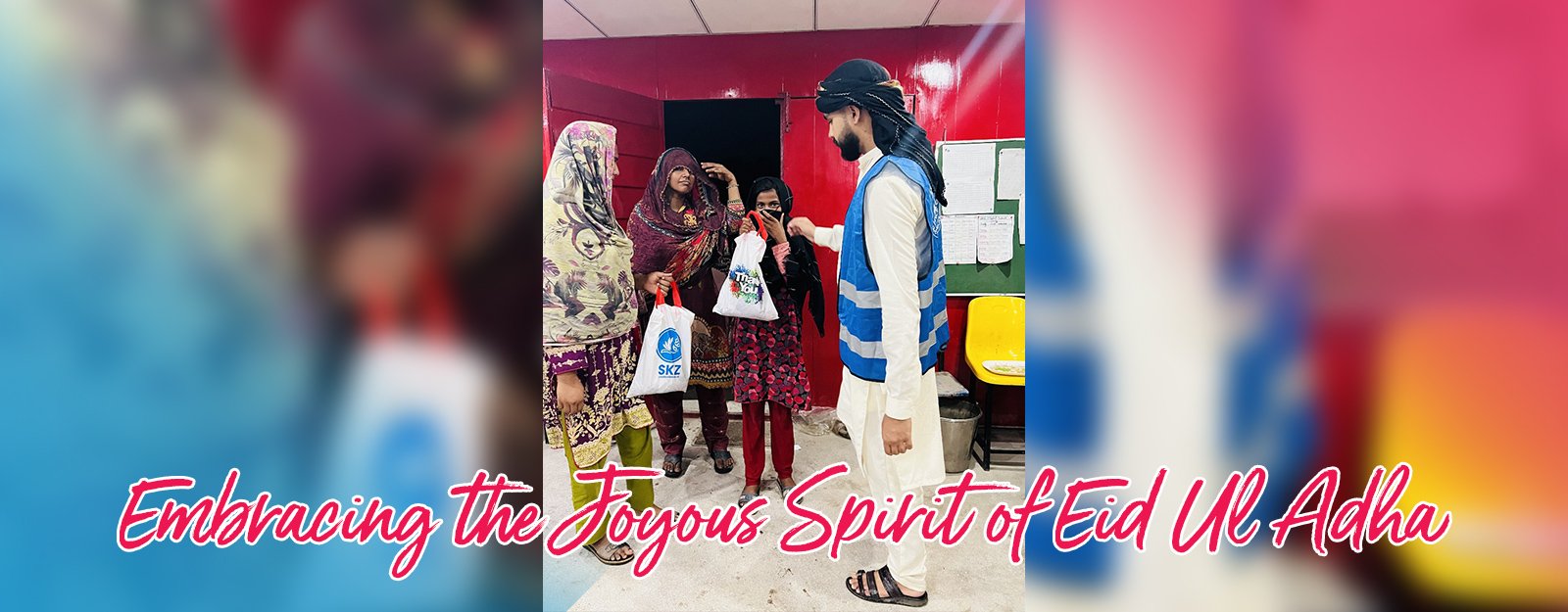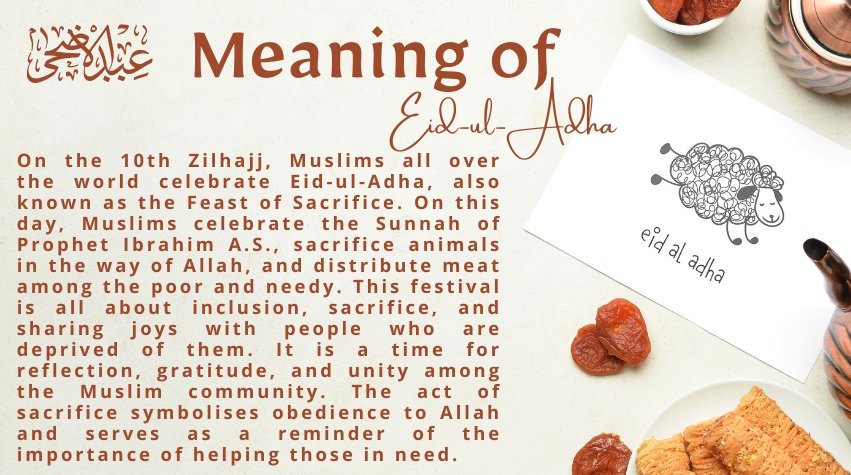
Eid-ul-Adha, also known as the Festival of Sacrifice, is a very important event in the Islamic calendar. It is the day when the Prophet Ibrahim A.S. sacrificed his beloved son and the Prophet Ismail A.S. as an act of obedience to Allah. This festival symbolises the importance of sacrifice, devotion, and submission. It’s an example for Muslims that they should be ready to sacrifice everything they have in the way of Allah, and in return, He will surely reward them with something they can’t even imagine. Eid-ul-Adha is celebrated after the culmination of the Hajj pilgrimage. Apart from this, Eid-ul-Adha is a joyous occasion for Muslims to celebrate with their family and friends and thank Allah for His blessings. In this article, we will give a brief overview of the true essence of Eid-ul-Adha and how Muslims around the world embrace the joyous spirit of Eid-ul-Adha.
On the 10th Zilhajj, Muslims all over the world celebrate Eid-ul-Adha, also known as the Feast of Sacrifice. On this day, Muslims celebrate the Sunnah of Prophet Ibrahim A.S., sacrifice animals in the way of Allah, and distribute meat among the poor and needy. This festival is all about inclusion, sacrifice, and sharing joys with people who are deprived of them. It is a time for reflection, gratitude, and unity among the Muslim community. The act of sacrifice symbolises obedience to Allah and serves as a reminder of the importance of helping those in need.

The celebrations start with Eid prayer, where Muslims gather in an open field or mosque and pray together. After the prayer, Muslims meet each other and share greetings and prayers. It is the perfect occasion to socialise and greet each other, sharing love. Additionally, families come together to enjoy delicious meals and exchange gifts as a way of showing appreciation and strengthening bonds.
After the prayer, Muslims head to perform the ritual of Qurbani in commemoration of the Prophet Ibrahim’s sacrifice. The animals that are usually sacrificed are cows, sheep, goats, and camels. The meat of the sacrificed animal is divided into three equal portions. One portion is for the family, one is for the neighbours, and the other is for the poor and needy.
After Qurbani, Muslims distribute the meat among family, friends, and the poor. People often visit their relatives and friends with meat and sweets. It is best to meet your friends and family, spread happiness, and forget the hustles of your life. Qurbani is not only a religious obligation but also a time to strengthen bonds with loved ones and spread joy within the community. Sharing the meat and sweets with others is a way to show gratitude and generosity during this special time.
Delicious food is an important part of Eid celebrations all around the world. Delicious food is a main part of the Eid celebrations. After the Eid prayer, it is the ritual to have some home-made sweat dishes. All the family members gather and enjoy the sweat, making memories, and then get ready for the Qurbani.
From delicious, flavorful Biryanis to succulent, juicy BBQs, Eid-ul-Adha is all about family gatherings and delicious treats. The best part about this is that these flavours are shared with people who are usually deprived of delicious food throughout the year.
The Eid feast is more than just a meal; it’s an opportunity to bring people together. Families gathering over the food table to share sweet little moments, carefree laughter, and conversation flowing freely create an atmosphere of love and warmth. The act of sharing food during Eid-ul-Adha symbolises generosity and unity within the community. It is a time to appreciate the blessings of abundance and togetherness while also remembering those less fortunate.
The act of Qurbani has a deep connection with Islamic faith. It reminds us of the true essence of being a Muslim. Qurbani is a symbolic act of sacrifice, reflecting the willingness to give up something valuable for the sake of Allah. It serves as a reminder of Prophet Ibrahim’s obedience and devotion to God.
The SKZ Foundation realises the true spirit of Eid. We celebrate Eid-ul-Adha in the slums of Lahore. We buy animals with them; the people of slums take care of the animals as their own. In this way, they feel included in the celebration. On Eid,, we sacrifice the animals and distribute the meat among the less fortunate families in the community, spreading joy and unity. This act of charity and sharing strengthens the bond between the privileged and underprivileged members of society, embodying the spirit of compassion and generosity that Eid-ul-Adha represents.
We believe that only education and skill development can empower youth, shaping their futures and substantiating the deprived community.
BANK DETAILS
Bank Name: Bank Islami
Account Title: Saya E Khuda E Zuljalal
Account Number: 2053-5712157-0001
IBAN NUMBER: PK60BKIP0205357121570001
Bank Name: Cashplus Bank
Account Title: Saya E Khuda E Zuljlal
Account Number: 07845728
Sort Code: 08-71-99

© SKZ Foundation TM 2017. Privacy Statement , Terms & Conditions Registered Charity No: 1200520. Head Office: 4 hollis lock, Chelmsford CM2 6RR UK. Disclaimer: SKZ Foundation is not affiliated with any external websites. SKZ Foundation is not responsible for the content of external internet sites and any links from external web sites to this site do not constitute an endorsement of that site by SKZ Foundation.
Copyright @ 2024 Single Solution. All Rights Reserved.